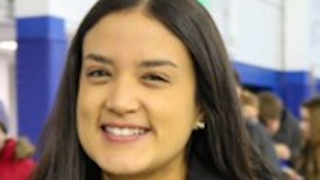Seton Hall Chapter of Girls Who Code Focuses on Women in Technology - Seton Hall University
Wednesday, November 18, 2020

Girls on a Mission:
The goal of this local chapter is to help college women connect with their peers,
build professional skills and network with a supportive community. Girls Who Code
is based on the principle stated in the official website, "We are on a mission to
close the gender gap in tech."
This international organization was founded in 2010, by Reshma Saujani, attorney and activist. As the first Indian American woman to run for U.S. Congress, Saujani noticed a significant gender gap in computing classes while visiting schools.
As a New York Times best-selling author, Saujani, in her book, Brave, Not Perfect, urges young women to not be afraid to fail. "We tamp down our dreams," she says, "along with our opportunities for happiness…being afraid to take risks, to use our voice to take a stand or ask for what we want, even to make mistakes."
Committed Seton Hall Advisor:
Seton Hall advisor to GWC, Dr. Pamela Adams, Associate Professor, Department of Management
at Stillman School of Business, elaborates, "As a woman faculty member who has also had a business career in tech-based
companies, I am so happy to support the Girls Who Code organization." Adams believes
that women from all disciplines will seek careers more often in the future that will
require technology skills of some kind. "This organization [GWC]" she continues, "is
there to support the choices that women make at the University and to help them prepare
themselves for new professions that will involve technology."

M. Juliana Macias, President, GWC-SHU
Projects and Hands-on-Learning:
Maria Juliana Macias, president of the GWC Seton Hall loop, says the group is working
on developing a program called "SHU Girls Who Code Project Gallery." According to
her description, "The Project Gallery will consist of different programming series
to allow our members to gain more hands-on learning experiences and transform our
ideas into tangible projects that we will deliver as a chapter." These projects, she
shares, will vary in levels of proficiency, length, and purpose, depending on members'
interest.
"For instance," Macias continues, "our first Project Series in the Spring will consist of coding our own Flappy Bird Game using a programming language called "Scratch" to introduce our members to basic coding concepts while also having fun!" Another project involves designing an official website for the SHU loop.
Mining Corporate Partners:
When it comes to career development, Macias says, "We are starting to reach out to
corporate partners, such as Cisco, Facebook, and Google, to host different networking
and career development events."
If interested in learning more about Girls Who Code on campus, contact Maria Juliana Macias at [email protected]. Find them on Instagram @girlswhocodeshu.






